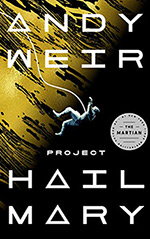
![]() imnotsusan
imnotsusan
8/11/2022
![]()
Oh, Andy Weir. I've now read all of his books (or, really, 2.5 of his books, since I couldn't finish Artemis.) I liked The Martian quite a bite, and was glad that in Project Hail Mary, he largely returend to the things he is better at.
In terms of tone (and certain aspects of the plot) this book felt almost like a sequel to The Martian. This could have been what happened if Mark Watney, the character from The Martian, had then been propelled into deep space. Like The Martian, Project Hail Mary at least initially focused on a man who finds himself alone in a difficult situation and must use science to help resolve some of his issues. The tone is generally humorous, even when the main character is confronting danger. In fact, despite the fact that the stakes are much higher in Project Hail Mary (all of humanity depends on the surivial and success of Ryland, the main character), I'd say the tone is even more glibly tongue in cheek than The Martian, which was fine with me. And, as one would explain, very few scientific details are left unexplained.
I have two criticisms. One is that the book is probably 100 pages too long. A lot of the extra weight were flashbacks establshing both the reason why Ryand finds himself in his present predicament and (I think) trying to add character depth. At a certain point, the flashbacks felt like they were adding unnecessary detail, backstore, and subplots that I just didn't care about. And I think they also speak to Weir's apparently general difficulty in writing character. I thought it was clever of him in The Martian to present the story as log entries - this creates the illusion that the main character might have emotional depths that he's just choosing not to share with the audience. Project Hail Mary, on the other hand, is told in first person. All of Ryland's "emotions" are expressed through actions rather than interior description. For instance, whenver Ryland felt sad, this would be expressed as "I cried," not "I felt sad." And I think the flashback (which were piled on especially thick towards the end) were stand-ins for emotional complexity - showing again through actions that Ryland was reluctant to participate in the book's central mission. I mean, it's not unusual for an author to show, rather than tell, the reader how a character is feeling. But Ryland proves to be a strikingly shallow first-person narrator. I think this would have worked better as log entries like with The Martian.
Also, the alien in the book - he was fine. I think I got more than I needed about his biology, but that's hard sci fi for you. It reminded me a lot of Mission to Gravity in that respects.
Overall, pretty enjoyable. Not as good as The Martian, but a vast improvement over Artemis.